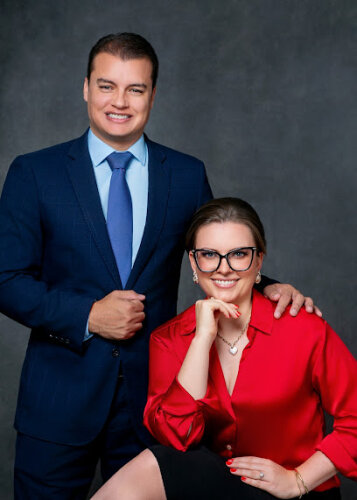Best Collaborative Law Lawyers in Blumenau
Share your needs with us, get contacted by law firms.
Free. Takes 2 min.
Free Guide to Hiring a Family Lawyer
List of the best lawyers in Blumenau, Brazil
About Collaborative Law in Blumenau, Brazil
Collaborative Law is an innovative approach to conflict resolution that emphasizes cooperation rather than contention, especially in family law matters such as divorce, child custody, and alimony. In Blumenau, Brazil, Collaborative Law offers a voluntary process where both parties work together, alongside their respective collaboratively trained lawyers, to reach mutually beneficial agreements outside the courtroom. This process minimizes hostility, promotes communication, and often leads to more satisfactory outcomes for everyone involved.
The movement towards Collaborative Law in Blumenau is growing, supported by local legal professionals and organizations dedicated to peaceful dispute resolution. The primary goal is to resolve conflicts in an efficient, respectful manner, reducing the emotional and financial stresses commonly associated with legal disputes.
Why You May Need a Lawyer
Collaborative Law is particularly valuable when parties wish to resolve issues amicably but need guidance on legal rights and obligations. Some common situations where you may require legal help in Collaborative Law include:
- Divorce and separation negotiations
- Setting up child custody and visitation agreements
- Negotiating alimony or spousal support
- Dividing property and financial assets
- Updating prenuptial or postnuptial agreements
- Family business division or succession planning
- Complex family dynamics requiring sensitive, customized solutions
A lawyer with expertise in Collaborative Law can help you understand your rights, facilitate communication, and draft legally sound agreements that reflect the interests of all parties.
Local Laws Overview
Collaborative Law in Blumenau adheres to Brazilian legal principles, particularly those found in the Civil Code and the Code of Civil Procedure. The Brazilian Bar Association (OAB) supports the Collaborative Law approach as an alternative to litigation. Key aspects of local laws relevant to Collaborative Law include:
- Family law matters such as divorce, child support, and custody can be settled out of court if parties reach consensus
- Agreements reached through Collaborative Law are binding once formalized and ratified by a judge, ensuring enforceability
- Confidentiality is an essential component, protecting the information shared during negotiation from being used in litigation
- Each party must be represented by a lawyer specifically trained in Collaborative Law methods
- Collaborative Law may involve other professionals, such as psychologists or financial advisors, to assist in complex cases
- The local judiciary encourages out-of-court settlements to reduce caseloads and promote quicker resolutions
Frequently Asked Questions
What is Collaborative Law?
Collaborative Law is a legal process where disputing parties and their lawyers work together to resolve issues without going to court. It is built on open communication, respect, and negotiation.
What types of cases are suitable for Collaborative Law?
Cases involving family law, such as divorce, child custody, property division, and alimony, are ideal for Collaborative Law. It can also be useful for inheritance disputes and business family matters.
Do I still need a lawyer if I choose Collaborative Law?
Yes. Collaborative Law requires each party to have a lawyer trained in this approach to ensure that legal rights are protected and agreements are equitable and enforceable.
Is Collaborative Law faster and less costly than litigation?
Typically, yes. The process avoids lengthy court procedures and focuses on swift, cost-effective conflict resolution.
What if we cannot reach an agreement during Collaborative Law?
If negotiations fail, the collaborative process ends, and the parties may proceed to court. However, the lawyers who participated in the collaborative process cannot represent the parties in litigation, so new legal representation is required.
Are agreements reached through Collaborative Law legally binding?
Yes. Once the agreement is finalized and ratified by a judge, it becomes legally binding and enforceable under Brazilian law.
Is confidentiality guaranteed in Collaborative Law proceedings?
Yes. All discussions and documents exchanged during the process are confidential and cannot be used as evidence if the case goes to court.
Can Collaborative Law be used for non-family disputes?
While most common in family law, Collaborative Law can sometimes be used in civil disputes or business matters, depending on the willingness of both parties.
How do I find a Collaborative Law lawyer in Blumenau?
You can find trained Collaborative Law lawyers through the local Bar Association, specialized law firms, or referrals from related organizations in Blumenau.
Can children be included in the collaborative process?
Yes. Professionals such as psychologists can be invited into the process to ensure that the best interests of children are adequately considered and protected.
Additional Resources
If you are seeking more information or assistance, consider contacting the following organizations and bodies for help with Collaborative Law in Blumenau:
- Ordem dos Advogados do Brasil - Seção de Santa Catarina (OAB/SC): Offers lawyer referrals and can confirm Collaborative Law credentials.
- Instituto Brasileiro de Práticas Colaborativas (IBPC): Provides information, training, and resources on Collaborative Law in Brazil.
- Family Courts of Blumenau: Can advise on formalizing agreements and procedures.
- Legal aid offices: For those needing free or reduced-cost legal support.
- Community mediation centers: May offer alternative dispute resolution services complementary to Collaborative Law.
Next Steps
If you believe Collaborative Law could be right for your situation in Blumenau, you should:
- Contact a lawyer trained in Collaborative Law for a preliminary consultation
- Gather all relevant documents and information about your case
- Discuss the collaborative process with the other party, if possible, to gauge willingness
- Consult the OAB/SC for lawyer recommendations or verification
- Consider involving other professionals such as psychologists or financial experts as needed
- Start the process by signing an agreement with your chosen lawyer outlining the collaborative approach
Seeking legal advice early ensures your rights are protected and increases the likelihood of a satisfactory, amicable resolution. Take the first step today by reaching out to a qualified Collaborative Law professional in Blumenau.
Lawzana helps you find the best lawyers and law firms in Blumenau through a curated and pre-screened list of qualified legal professionals. Our platform offers rankings and detailed profiles of attorneys and law firms, allowing you to compare based on practice areas, including Collaborative Law, experience, and client feedback.
Each profile includes a description of the firm's areas of practice, client reviews, team members and partners, year of establishment, spoken languages, office locations, contact information, social media presence, and any published articles or resources. Most firms on our platform speak English and are experienced in both local and international legal matters.
Get a quote from top-rated law firms in Blumenau, Brazil — quickly, securely, and without unnecessary hassle.
Disclaimer:
The information provided on this page is for general informational purposes only and does not constitute legal advice. While we strive to ensure the accuracy and relevance of the content, legal information may change over time, and interpretations of the law can vary. You should always consult with a qualified legal professional for advice specific to your situation.
We disclaim all liability for actions taken or not taken based on the content of this page. If you believe any information is incorrect or outdated, please contact us, and we will review and update it where appropriate.













